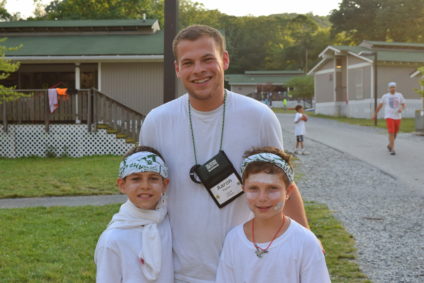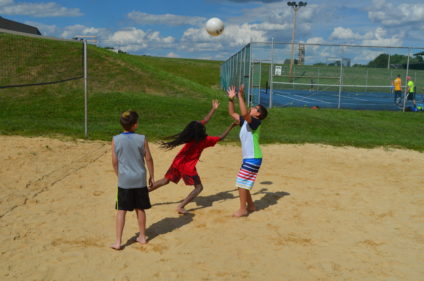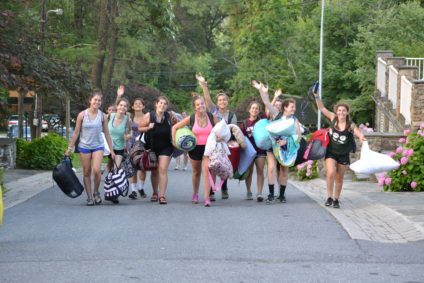7 Things I Wish I’d Known Before Sending My Child to Sleepaway Camp
The first time I went to sleepaway camp, the excitement was tangible. I couldn’t wait to sleep in a bunk with tons of new friends, play sports, make crafts and sing bonfire songs. It was a rite of passage I’d long awaited and now it was here. But I was also nervous. What if I didn’t make friends? What if the food wasn’t good? What if I felt homesick?
For first-time campers, there are quite a few unknowns. This, of course, is common knowledge. But what no one really talks about are the thoughts and feelings that PARENTS experience when their child goes to sleepaway camp for the first time. Parents also feel excited and nervous before the first day of camp. However, while boys and girls quickly learn the ropes through immersing themselves in the camp experience, Parents, left behind in the city, sometimes have a harder time adjusting to their empty or emptier nest come summertime.
Even though I’d been to camp as a child, it was still hard to send my own kid to sleepaway camp for the first time. I tried to calm my concerns by remembering the amazing summers I spent at camp, but honestly, it’s hard to rationalize parental worries with childhood memories. In truth, my kid had the best time at camp. There really was no cause for concern, only several unknowns. Here’s a list of the top 7 things I wish I’d known as a parent, before sending my child to sleepaway camp.

1. Your kids are in good hands
From the photos on the camp website, it may seem as though your child is wearing the same outfit every day or that they are gaining or losing weight. You might be concerned that they aren’t showering often enough – or at all, but rest assured: camp counselors and staff members will ensure your child is showered, properly dressed and well-fed – most of the time. Your kids are running around all day, every day, for an entire summer. They’re going to be hungry. They’re going to get dirty. They’re clothes will probably stink. But don’t you sweat the small stuff. The important thing is that they’re having fun and ARE being well taken care of.
2. Ziploc bags can be organizational saviors
All hail the Ziploc bag. Perfect for storing spillables and organizing personal items, Ziplocs are easy, cost-effective ways of helping your kids succeed at their first stab at independence. Some parents even store individual days worth of clothes in large Ziplocs, taking the guesswork out of getting ready for each new day.
3. “Campsickness” is real
Your child may or may not experience homesickness, but they will most likely be campsick when they come home. Try not to take it personally if your child seems less-than-thrilled to be back. Camp is an insular experience – a taste of independence and non-stop kid-geared programming. Your boys and girls will miss being with their friends all of the time and may not know what to do with themselves when their days and nights are not packed with activities. Once school starts up again and they return to their regular schedules, the campsickness will begin to fade and your kid will become more pleasant to be around.

4. If they’re not writing, it’s probably because they’re having a great time
While camp counselors do their best to ensure your kids write home often, sometimes your sons and daughters are simply having too much fun to sit down and put pen to paper. Instead of worrying that your child’s camp experience is nothing special to write home about, consider the possibility that they are busy taking part in activities and socializing with bunkmates. Writing home just may not be at the top of their minds.
5. Complaints may seem urgent, but probably aren’t
If your kid happily gets dropped off and immediately jumps into the role of the happy camper – great. But chances are, first-time campers (and even some returning campers) will need time to adjust. Often, parents of homesick children are quick to take every complaint at face value, but in most cases, there’s no reason to panic. It can be really hard to gauge the urgency of the issues they raise in handwritten letters. Plus, by the time mail actually reaches your home, most of your camper’s challenges will be resolved. Give your kids the time and space to work out their issues, but know that you can always consult with camp staff if you are concerned about your son or daughter’s well-being. What seems like a rocky start often leads to a smooth and sensational summer camp experience.

6. When camp ends, they will be (secretly) excited to see you
The end of any camp session is emotionally charged – for campers and their parents. Keep in mind that children and adults show their feelings in different ways. When your son answers your questions in single-syllable words or when your daughter avoids giving you a big hug and instead asks what’s for dinner, it doesn’t mean they didn’t miss you. It just means they’re trying to play it tough and act mature. That’s why, when you go to pick them up, give them some space to say goodbye to their counselors and fellow campers. Do not linger. In just a few minutes, they will be all yours, but for the moment, they need to mourn the end of an awesome summer and the chance that they won’t see their bunkmates again for a while.
7. It’s ok to feel liberated and enjoy adult time
Time flies when you’re “empty nesters”. Don’t wallow in misery and self-pity while your kids and swimming in the pool and roasting marshmallows over an open fire. Enjoy the time without kids (or without some of your kids) and enjoy some quality time with your spouse, relatives or adult friends. Do things you wouldn’t usually do with kids around, like going out to a late movie or show or booking a massage for 5 o’clock in the evening. Why should your kids be the only ones having fun during the summer months?
Sending your kid is an amazing experience for campers – and their parents. There are always unknowns in new situations. I hope that my sharing these top seven things I wish I’d known before sending my child to camp helps you feel more confident in your decision to give your son or daughter the summer experience of a lifetime.